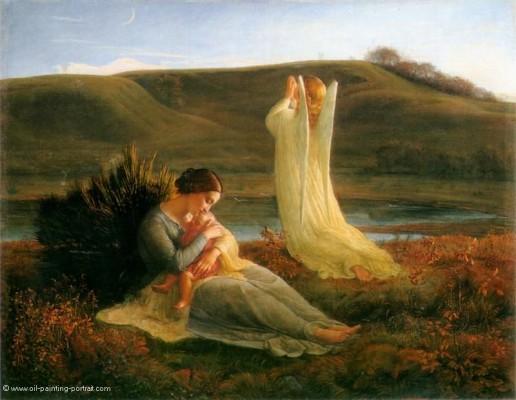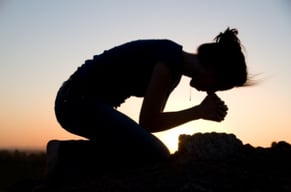 Leslie Rohrbacker
Leslie Rohrbacker
Editor's Note: Today, we welcome Leslie Rohrbacker to our CatholicMom.com family of contributors. Leslie shares her wonderful writing at her Introducing Grace blog and will be joining us here monthly. Please join me in giving her a warm welcome! LMH
Like any earnest believer, I suppose, I question the presence of God in trying or tragic times -- the unthinkable death of a child, the untimely passing of a young parent, famine, poverty, disease, war and any other scourge of this worldly life. There are seemingly no answers. Non-believers scoff at the mere question and declare that it is because there is no deity. Believers, on the other hand, accept the lack of answers as an ironic road post of faith. Some like me, a Catholic, believe that suffering is almost always followed by redemption. I have come to believe that you can find God – although not necessarily answers to why difficult, even terrible things, happen -- in the most inhospitable of places. I know because I found God in the NICU in February 2007.
Anyone who has ever been in a neonatal intensive care unit or “NICU,” knows it is a sobering place. A NICU is an intensive care unit, after all, but exponentially more intense because of the presence of babies (could be 40 or more at a time), many of whom are fighting for their lives only minutes or hours after their entry into the world. NICU’s are bright and loud with the incessant beeping of monitors and whir of imposing machines. There is little laughter and surprisingly little crying despite the presence of infants, although there are plenty of tears from distraught parents who hover day and night. There are physicians, nurses, respiratory therapists, social workers and myriad professionals in constant rotation. They share no idle chatter or casual conversation and their focus is singular.

My own children, fraternal twin boys, were born nearly seven weeks early because one of them, Jed, was in distress. Jed had stopped growing in my womb because he was not getting enough nutrients and oxygen from one of the two placentas my body had made during the first trimester of my pregnancy. My body, taxed by creating two, and supporting three, lives, was showing signs of profound fatigue. In turn, my baby boy was running out of time. The doctors said he would die or suffer brain damage if we did not deliver him immediately. His brother, Luke, was bigger and showing no signs of distress, but would be forced into the world before nature and biology signal he would be ready. The doctors predicted that the smaller baby, Jed, would do better than the bigger one because sadly he had already grown accustomed to fighting for his life. They were right.
And so Luke and Jed arrived one minute apart on a cold February evening with me, my husband, and a team of medical experts ready to welcome them to the harsh lights and sounds of a cramped OR. Jed was a mere three pounds but hearty, clearly just thankful to be emancipated from the cramped recesses of my womb. He sprawled out in the comparative luxury of his incubator. In the coming days, we would all smile at his “sunbathing” under the lights designed to cure his jaundice. Luke, on the other hand, was relatively big for a preemie at five pounds, but struggled immediately to take air into his premature lungs. So violent were his first efforts to breath that one of his tiny, brittle and undeveloped lungs collapsed shortly after birth. Much to my heartbreak, he went on a ventilator and had a chest tube put in only hours after his birth. I would hold him for the first time an interminable five days after his birth.
So, where was God, you might ask? Simply, he was everywhere. He was there when fortuitous tests proved that it was time to deliver my babies and face the complexity of endangering one to save the other. He was there when I got to kiss each of their cheeks moments after their birth because I could not immediately hold them. Surely, he was there in the iron will of a miraculous, perfectly formed three pound creature taking milk from a dropper and never needing an ounce of oxygen to breathe after his dramatic entry into the world. He was unquestionably present in the pathos of a baby fighting through the pain of developing his premature lungs to get to the arms of his mother whose voice he knew from the womb and recognized in the distance. God was in the ceaseless whir of the ventilator that kept my baby alive for nearly seven days until he was ready to take his first tentative breaths, while we all held ours. No doubt he was there when I held Luke for the first time and we all watched his oxygen saturation levels rise on the monitor for the simple and primordial reason that he was in his mother’s arms.
And then there were the neonatologists – miraculous healers themselves, in my estimation -- who reassured the way they knew best, with their prolific gifts of knowledge and experience. I picture God in the quiet efficiency and skills of the nurses, who willingly mothered my boys during the hours I would sadly leave them to go home to my cold, empty house. I suppose God was there too in the quiet strength of my husband who would devotedly carry my breast milk off to the hospital every morning where he would spend his own sacred time with our sons before he would get on the early train to work in New York City. Of course, I cannot forget the other parents who would stand close by in the open ward keeping vigil over their own babies. We would exchange few words but I imagine God ferried the quiet empathy and solidarity between us.
Certainly, there were moments then and even for a long while after that I was angry and resentful that I did not experience the more classic and idyllic “miracle of birth” experience. While in the maternity ward, I would hear mothers in adjoining rooms fussing over their babies who slept in the room with them, while I was left to shuffle through the pain of my abdominal incision down the long hallway to the sterile nursery with its maddening florescent lights, machines and perpetual sense of urgency. While those “lucky” moms held, fed and shared their babies with joyous visitors, I lay alone in my bed and begged God to take care of my babies. And he did.
My boys came home with me nearly three weeks after their birth. Our struggles in the NICU were real and wrenching and, yet, they were made by bearable by the kindness and dedication of strangers and the reassuring brilliance of professionals and technology that literally saved my children’s lives. Would I feel the same way had the unthinkable happened to either of my children? Naturally, hindsight brings into focus insights that one perhaps does not have in the moment. Indeed, part of my epiphany was that my children’s lives were not imperfect miracles because they were not delivered to my hospital bedside swaddled in darling blue blankets and hats. Plainly, the fact that my children survived directed me to certain revelations and I recognize that I have that luxury while others do not. But I choose not to cynically believe that these revelations are borne purely out of my very happy ending. Because I know that in those moments in real time and regardless of the outcome (which I terrifyingly did not know) I reached out for and felt the presence of God.
 I am no closer to knowing why some live and some die, why some suffer and others don’t. And I don’t pretend I ever will be or that I have somehow cornered the market on redemption because of a profound personal experience. What I do believe I know is that life is always both imperfect and simultaneously miraculous; and there are cruel and frightening circumstances where human kindness and empathy are divine. I accept these as just a few of the many intangible mysteries of the human condition and, yes, my faith. Consequently, I am humbled and grateful for all of those who walked with me during those 21 days in 2007 and, for many reasons, I am eternally thankful that God was in the NICU.
I am no closer to knowing why some live and some die, why some suffer and others don’t. And I don’t pretend I ever will be or that I have somehow cornered the market on redemption because of a profound personal experience. What I do believe I know is that life is always both imperfect and simultaneously miraculous; and there are cruel and frightening circumstances where human kindness and empathy are divine. I accept these as just a few of the many intangible mysteries of the human condition and, yes, my faith. Consequently, I am humbled and grateful for all of those who walked with me during those 21 days in 2007 and, for many reasons, I am eternally thankful that God was in the NICU.
Copyright 2012 Leslie Rohrbacker
About the Author

Guest
We welcome guest contributors who graciously volunteer their writing for our readers. Please support our guest writers by visiting their sites, purchasing their work, and leaving comments to thank them for sharing their gifts here on CatholicMom.com. To inquire about serving as a guest contributor, contact editor@CatholicMom.com.


.png?width=1806&height=731&name=CatholicMom_hcfm_logo1_pos_871c_2728c%20(002).png)
Comments